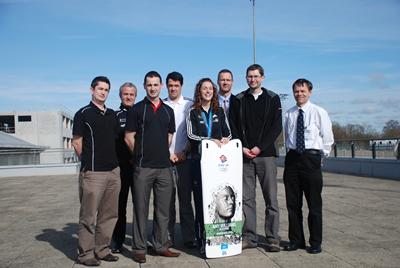Amy Williams’ gold medal-winning performance in the 2010 Winter Olympics in Vancouver was a huge achievement for the Performance Sports Engineering research team in Engineering and the Environment. Research engineers have been working with British Skeleton and UK Sport to help athletes prepare for major competitions since October 2006.

Rachel Blackburn and James Roche, both EPSRC-funded EngD students working under the supervision of Dr Stephen Turnock, have been supported by UK Sport as part of its work with British Skeleton. The four-year project has combined experimental work, the latest computational analysis techniques and testing in the University's RJ Mitchell wind tunnel, with the aim of improving the understanding of bob skeleton performance. Competition within the sport is fierce and the margin of victory can be as little as 0.01 of a second.
One fundamental element of the programme that British Skeleton's Performance Director Andreas Schmid, a former world champion slider himself, was keen to perfect was the sled. Now affectionately known as 'Arthur', Amy's sled was originally known by codename 'Blackroc' after its co-designers.
Amy Williams explains: "It gives you such confidence going to a major competition knowing that your equipment is world class and your preparation methods are at the cutting edge of your sport. All you need to worry about is delivering on the day.
"I'm really grateful to all the scientists and engineers at the University of Southampton and to BAE Systems who helped make me and 'Arthur' such a successful team."
As in the other sliding sports of bobsleigh and luge, the start is crucial. Once on the sled, the sliders must find the best line and steer smoothly through each turn to keep their speed high. Sliders lie face-down and head-first and steer through subtle movements of their legs and trunk. There are two individual skeleton events, one for men and one for women. The events consist of two days of competition, with two heats held on each day. The individual with the shortest combined time over the four runs wins.
Dr Scott Drawer, Head of Research and Innovation at UK Sport, says: "Like most top competing nations the British Bob Skeleton Association, in partnership with UK Sport, has worked with various science and technology partners – including the University of Southampton and BAE Systems – over the past four years to ensure the best programme is in place for their athletes.
"This has included cutting-edge techniques in terms of the athletes' physical conditioning and preparation, as well as the kit and equipment for use in competition."
In addition to supporting British Skeleton, Engineering and the Environment currently has one Engineering Doctorate and three PhD students supported by UK Sport to allow in-depth study of other sports in a research-based environment. The University of Southampton's Wolfson Unit has been awarded Innovation Partner status by UK Sport, which means it is recognised by UK Sport as providing services that meet the world-class standards of excellence in performance science and innovation required to make an impact on the UK's best athletes and coaches.